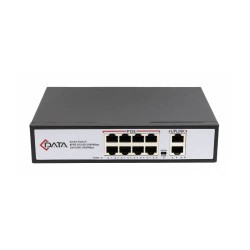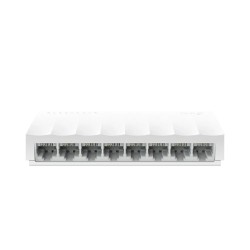Switch
Best Quality Network Switch For Every User
A network switch is networking gear that links devices on a computer network by employing packet switching to accept and forward data to the target device. It is also referred to as a switching hub, bridging hub, or, by the IEEE, MAC bridge. A network switch is a multiport network bridge that forwards data at the OSI model's data link layer, or layer 2, using MAC addresses. By adding routing capability, certain switches can also forward data at the network layer (layer 3). These switches are often referred to as multilayer switches or layer-3 switches.
Popular Network Switch Brands in Bangladesh
Quicklink Technology offers a variety of switches for networking and routing, including gigabit switches, Ethernet smart switches, rack mount switches, and unmanaged switches from well-known companies including Netgear, Cisco, TP-Link, Mikrotik, D-Link, TOTOLINK, Tenda, and Perfect. We provide the most competitive prices available, catering to a wide range of Bangladeshi market budgets.
Types of Network Switches
Network switches come in various types to cater to different networking needs. A few common Network Switch types are listed below:
Unmanaged switch
Unmanaged switches lack an options or configuration interface. Plug them in and get going. Since they are usually the least priced switches, small offices and home offices frequently employ them. Unmanaged switches can be installed on a desktop or rack.
Managed Switch
Managed switches have one or more methods to modify the operation of the switch. Common management methods include: a command-line interface (CLI) accessed via serial console, telnet or Secure Shell, an embedded Simple Network Management Protocol (SNMP) agent allowing management from a remote console or management station, or a web interface for management from a web browser. Two sub-classes of managed switches are smart and enterprise-managed switches.
Smart Switch
Smart switches (aka intelligent switches) are managed switches with a limited set of management features. Likewise, "web-managed" switches are switches that fall into a market niche between unmanaged and managed. For a price much lower than a fully managed switch they provide a web interface (and usually no CLI access) and allow configuration of basic settings, such as VLANs, port-bandwidth and duplex.
PoE Switch
Power over Ethernet (PoE) switches combine data and power into a single cable, simplifying installation and reducing cable clutter. They are commonly used to power devices such as IP cameras, wireless access points, and VoIP phones.
Modular Switch
Modular switches can be installed in a large, fixed-form factor chassis that has room for two or more cards. They are switch cards for modular or chassis-based switches. This type of switch offers the most flexibility and upgradability because switch interfaces can be altered as needed.
Performance
The performance of a network switch is influenced by several factors, including processing power, memory capacity, and switching fabric. Large data quantities may be handled by high-performance switches with little delay, guaranteeing continuous and seamless network operations. It's critical to consider aspects like throughput, packet forwarding rate, and Quality of Service (QoS) capabilities while assessing switch performance. Furthermore, characteristics like buffer capacity and jumbo frame support can have a big impact on how well the switch manages high workloads.
Data Transfer Rate
The speed at which data is sent between devices is referred to as a network switch's data transmission rate. With data transfer speeds of up to 1 gigabit per second (Gbps), gigabit Ethernet switches provide modern networks with dependable and quick connectivity.
Our selection of network switches provides options to suit your requirements. For dependable connectivity at regular speeds, go with our 10/100 Mbps switches; for blazing-fast data transfer rates, go to our 10/100/1000 Mbps switches. For bandwidth-intensive activities like file sharing, online gaming, and video streaming, high-speed data transfer is necessary.
Number of Ports
The maximum number of devices that can be connected to a network at once depends on the total number of ports on the switch. Switches are available in a variety of designs, from compact desktop devices to substantial rack-mounted equipment. Are you trying to increase your network's capacity? To meet your demands, our selection of network switches provides a choice of port options. Switches of 10, 12, 16, 18, 20, 24, or 26 ports are available in our assortment, offering versatility for networks of various sizes. No matter the size of your company, our switches provide dependable connectivity and effective data transfer. By upgrading your network infrastructure now, you may use our premium switches to enjoy flawless performance. Discover the ideal solution for your networking needs by looking through our alternatives right now.
How does a network switch work?
- Edge, or access, switches: These switches manage traffic either coming into or exiting the network. Devices like computers and APs connect to edge switches.
- Aggregation, or distribution, switches: These switches are placed within an optional middle layer in a network topology. Edge switches connect into these and send traffic from switch to switch or send it up to core switches.
- Core switches: These network switches form the backbone of the network. Core switches connect aggregation or edge switches, users or device edge networks to data center networks and enterprise LANs to routers.
How to set up a network switch?
Depending on the type of network, different types of switches can be used. For a small office LAN or a home network, a network switch is typically plugged into one of the ports on a router. A switch expands the number of wired internet-connected devices in a small network, including desktops, laptops and printers.
The typical steps involved in setting up a network switch are the following:
- The switch is purchased based on the needs and requirements of the network.
- The port on the switch is connected to the router using a straight-through cable. Most switches contain uplink ports, which are used for connecting to devices such as routers. However, if an uplink port is not present on a switch, any port can be used to connect to the router.
- Once the switch is physically connected to the router, the IP addresses of the devices are configured.
Buy From The Best Network Switch Shop in BD
Quicklink Technology is the largest IT retailer in Bangladesh, offering a wide collection of networking products at competitive prices. Buy your favorite Network Switch at the best price in BD from Quicklink Technology. You can also buy laptop, router, LAN card, Access Point and Monitor from Quicklink Technology. Visit any physical shop near you or simply order online to enjoy home delivery all over Bangladesh. At Quicklink Technology, we offer 24/7 online support to meet all your Network Switch-related needs. Updating prices for our Network Switch products on our platform is hassle-free. We are committed to promptly resolving any warranty issues to ensure your complete satisfaction. Before finalizing your purchase, we encourage you to inspect the received Network Switch thoroughly. Should you have any questions or concerns, feel free to reach out to us or return the item to our delivery personnel. Stay informed about discounts, new Network Switch launches, and upcoming events by subscribing to our website. Experience seamless transactions with Quicklink Technology and explore our diverse range of Network Switch products.
FAQs
Q: What factors should I consider when buying a network switch?
A: When purchasing a network switch, consider factors such as performance, scalability, security features, port count, and budget constraints.
Q: Are managed switches worth the extra cost?
A: Managed switches offer advanced features and greater control over network configurations, making them ideal for larger networks and businesses with specific networking requirements.
Q: Can I upgrade my network switch in the future?
A: Yes, many network switches support firmware updates and expansion modules, allowing for future upgrades and enhancements to meet evolving networking needs.
Q: How do I ensure the security of my network switch?
A: Implementing strong security measures such as MAC address filtering, port security, and regular firmware updates can help enhance the security of your network switch.
Q: What is the difference between a router and a network switch?
A: While both routers and network switches are networking devices, routers are responsible for directing traffic between different networks, while switches are used to connect devices within the same network.
-300x91.png)

-250x250.jpg)

-250x250.jpg)
-250x250.jpg)

-250x250.jpg)



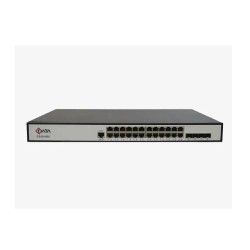
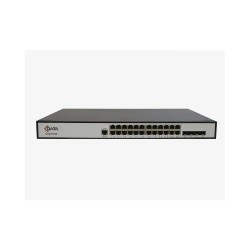
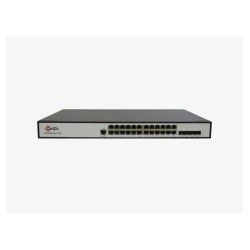
-250x250.jpg)
